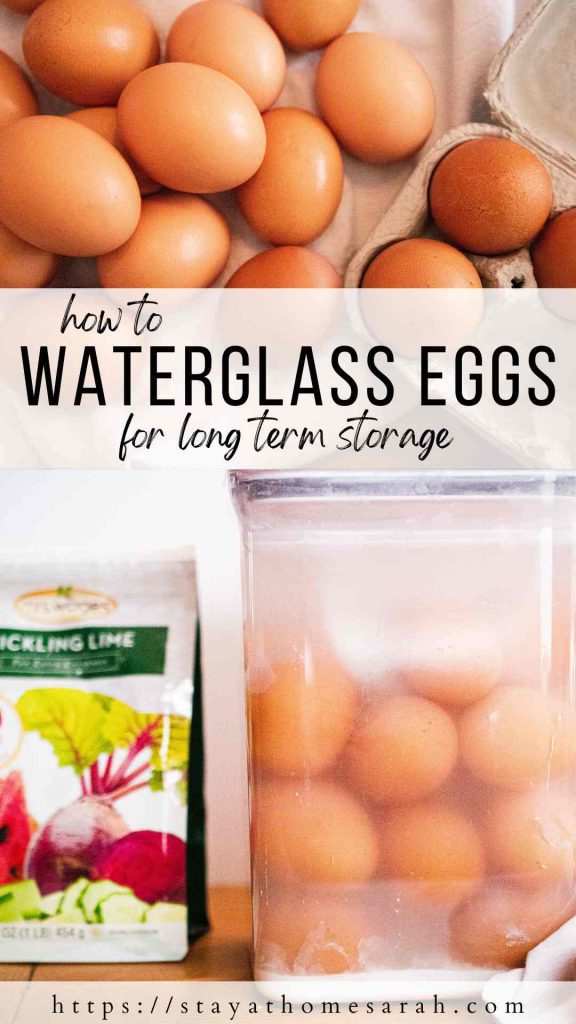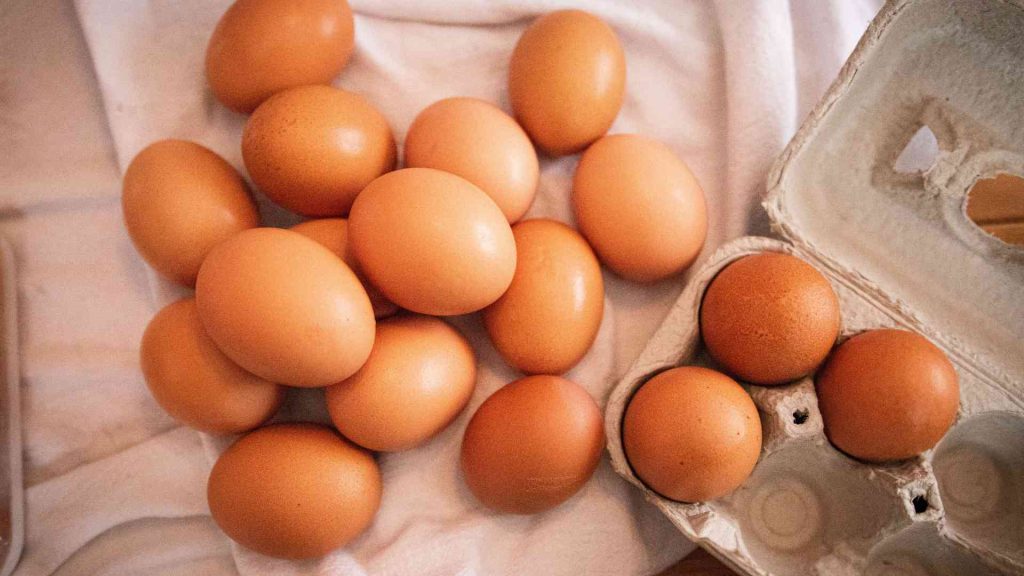How to Water Glass Eggs for Long Term Storage
Spring is right around the corner which means that backyard egg production will be picking up again! Water glassing eggs is the best way to preserve any extra eggs during this season. Knowing how to water glass eggs is a very useful skill that will allow you to enjoy your own eggs all year long.

This post contains affiliate links. As an Amazon Associate, I receive a small commission at no extra cost to you. Read my full disclosure here.
what is water glassing eggs?
Water-glassing eggs is a long standing egg preservation method. There are several ways to water glass farm-fresh eggs. But my favorite method of egg preservation is to water glass clean unwashed eggs in a pickling lime solution. Pickling lime (also known as hydrated lime, calcium hydroxide, or slaked lime) and water can be mixed to create a solution that ‘seals’ the egg shell, preserving the eggs at room temperature for 12 months.
Many people may not realize this, but chickens go through natural cycles of high and low egg production. In the spring and summer when the days are longer, egg production is at an all time high. In the winter when the chickens do not have as much daylight, egg production slows down drastically. We live in the northern United States, so winter eggs often freeze and crack before we can get to them anyways. For these reasons, we rely on our water-glassed eggs during the winter months.
When hens lay eggs, the egg shells are covered in a ‘bloom’ which is a natural protective coating. When the bloom is intact, the eggs are able to be stored at room temperature without spoiling. After the eggs are washed, they then need to be refrigerated. Water glassing eggs ONLY works with eggs that still have the bloom intact and are completely clean. Eggs that have chicken poop or mud on them will not work to water glass. If the eggs have been washed, they will not work to water glass. Only eggs that come out clean and dry can be water glassed. Changing the straw or bedding in the chicken coop regularly helps keep the eggs clean.
supplies need for water glassing eggs
- fresh, clean, unwashed eggs
- pickling lime (hydrated lime)
- room temperature water (filtered or distilled water are best if you have tap water)



how to water glass eggs
Start with a clean vessel to store your eggs. Half gallon jars or food-grade buckets work best for long-term storage. Whatever you choose needs to have a cover that can be sealed so the water doesn’t evaporate. The ratio of pickling lime to water is 1 oz of pickling lime to 1 quart of water. This amount can be multiplied to be as large as you want. Add the water to the container you are using. Weigh the correct amount of lime for the amount of water you are using. Add the lime to the water and whisk until the lime is completely dissolved. The water will look milky.
Next, gently add your unwashed, clean eggs to the pickling lime solution. You probably want to wear gloves for this step as the lime can be very drying to the skin. Add as many eggs as you want, as long as they all remain completely submerged. Cover the container so the water does not evaporate. If water evaporates and there are eggs that are exposed, those eggs are no longer preserved and should be discarded. Take the eggs out as you need them, and wash before using.
It is really that simple! As long as your container is sealed, these eggs will remain fresh at room temperature and can be enjoyed throughout the year.


what is pickling lime/hydrated lime?
Hydrated lime usually a combination of oyster shells, bones, and limestone that have been burnt in a kiln, then hydrated with water. It’s a natural product that’s totally safe to use. You can get it on Amazon here. It’s also called builder’s lime and can sometimes be found in a local hardware store.
how do you store water glassed eggs?
Water glassed eggs do not need any special storage space. They should be kept at a fairly consistent temperature, just avoiding extreme heat/freezing. If you are using a jar or other clear storage container, just keep them out of direct sunlight. And make sure the container is sealed to avoid any lime water evaporation. You don’t want your eggs to be exposed to the air.
when should you water glass eggs?
You can water glass eggs anytime! It is most common for people to water glass eggs in the summer months because that is when the chickens natural egg production is the highest.
can you preserve store-bought eggs?
No, unfortunately you cannot preserve store-bought eggs this way because they have been washed and the bloom is removed. Water glassing eggs only works if the bloom is still intact.
can you use tap water?
Filtered or distilled water are preferred over tap water. But if tap water is your only option, just leave your container of water uncovered for 24 hours and the chlorine will evaporate.
how many eggs can you preserve?
You can preserve as many eggs as can fit in the small or large container you are storing them in while still being completely submerged. The ratio of pickling lime to water remains the same no matter how many eggs you are preserving in it.
do you need to stir the lime back in when it settles to the bottom?
As you can see in the photos, the lime does settle to the bottom of the container. You do not need to stir it back in – there is still plenty of lime in the water to effectively preserve the egg.
how long do preserved eggs last?
Water glassed eggs are best up until about 12 months. When you use your water glassed eggs, they should never be floating in the bucket. If they are, throw them out. The bucket may not smell great when opened, but the eggs themselves should not have any smell when you crack them open.
do you need to wash eggs when they come out of the lime solution?
Yes, it is best to give the eggs a quick rinse to remove the pickling lime before using.
can you preserve other kinds of eggs this way?
Yes! Chicken eggs, duck eggs, quail eggs, etc. can all be water glassed using this method.
where do you get unwashed eggs if you don’t have backyard chickens?
The best way to get eggs with the bloom still intact is to find local farmers selling their extra eggs in the summertime. If you request that the eggs are not washed, usually people are willing to accommodate.
does the pickling lime pickle the eggs?
Nope! The eggs are not pickled. The end result is raw eggs.
does water glassing really work?!
Yes!! I water glassed an entire 3 gallon bucket of eggs last spring that we are still enjoying today. I did notice that the texture of the egg changes slightly after being preserved. The egg yolks seem to be the same, but the egg whites are much more runny. The texture of a fried or scrambled egg is slightly different, so I like baking with the water glassed eggs the best. They work just fine! There were also a few eggs that had fine cracks in the shells when I took them out. The egg did not break open into the lime water, thankfully. But I do not recommend using any eggs that have any cracks in the shells, large or small.

conclusion
Knowing how to water glass eggs is a helpful preservation skill to have. Especially with the price of eggs, there are more and more people acquiring backyard chickens. And it is wonderful to be able to enjoy those fresh eggs all year round! If you do not have chickens but are considering getting some, there are a couple of books that are very helpful to have on hand. These books have been great resources when we have had questions:


Also check out this post: Glossary of Terms Every Backyard Chicken Keeper Should Know
print the instructions for later –

How to Water Glass Eggs
Water glassing eggs is the best way to preserve any extra eggs during the abundant summer months to enjoy all year long.
Ingredients
- Clean, unwashed eggs
- 1 oz pickling lime
- 1 quart of water
- Half gallon jar or food grade bucket
Instructions
- Add the water to the container you are using. Weigh the correct amount of lime for the amount of water you are using. Add the lime to the water and whisk until the lime is completely dissolved. The water will look milky.
- Next, gently add your unwashed, clean eggs to the pickling lime solution.
- Add as many eggs as you want, as long as they all remain completely submerged. Cover the container so the water does not evaporate.
- Take the eggs out as you need them, and wash before using. Store up to 12 months.
pin for later –

